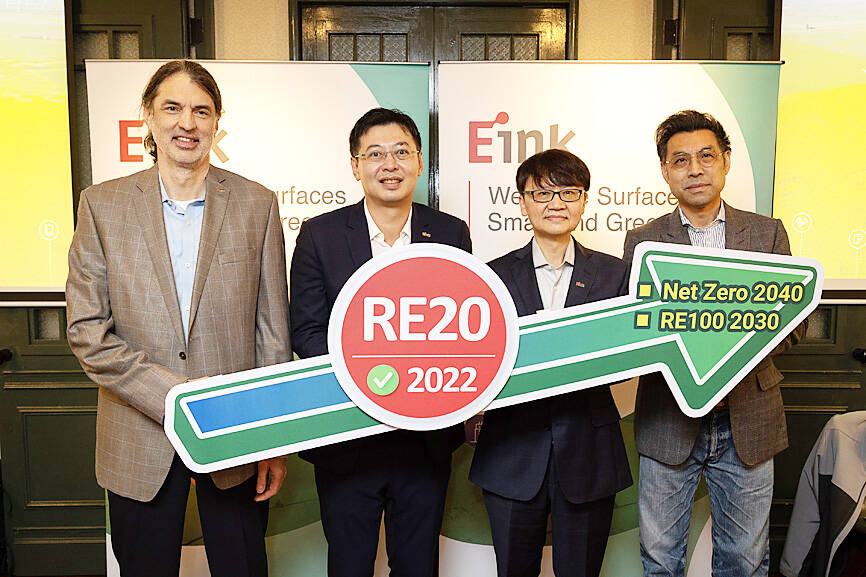E Ink Holdings Inc (元太科技), the world’s sole e-paper display supplier, yesterday said it expects to continue to grow its business next year as large-scale retailers in the US are joining their European counterparts to install electronic shelf labels (ESLs) as a labor shortage drags on.
Walmart Inc earlier this year announced a plan to adopt ESLs after nearly eight years of evaluations, while Best Buy Co and Home Depot Inc also adopted the cost-efficient electronic labels, following in the footsteps of Carrefour SA and Tesco PLC in Europe.
“We believe E Ink will grow next year, despite the global economy facing rising recession risks... The [revenue] growth might not be as dramatic as this year’s,” E Ink chairman Johnson Lee (李政昊) told a media gathering in Taipei yesterday.

Photo courtesy of E Ink Holdings Inc
If the global economy enters a recession next year, retailers might hesitate about spending on ESLs, the company said.
E Ink’s revenue soared 67 percent year-on-year in the first three quarters of this year to NT$21.52 billion (US$701.3 million), the company’s highest revenue for the period.
More than half of the company’s revenue came from the ESL segment, the first time the business became the firm’s major source of income, E Ink said.
The company’s ESL business is expected to post its fastest growth next year, as large-scale retailers, including Best Buy and Amazon.com Inc are to install the devices, E Ink said.
“We are seeing that more retailers are willing to introduce ESLs extensively,” Lee said. “This year, we are benefiting from wide adoption of ESLs from some European retailers. We have been endeavoring to ship goods there.”
About 600 million ESLs were installed from 2012 to last year, accounting for about 10 percent of the overall market of 6 billion shelf labels, Lee said.
As long as the penetration rate continues to rise, there would be growth opportunities for the company, he said.
There is also replacement demand, Lee said, adding that the lifecycle of an electronic label is seven to eight years.
E-paper displays used in e-notes would be the company’s second growth engine next year, as the world’s top 10 tablet vendors, except Apple Inc and Samsung Electronics Co, have rolled out e-notes, Lee said.
E Ink president F.Y. Gan (甘豐源) said electronic labels used on packing boxes would be the next market with strong growth potential.
Each year, about 10 billion boxes are consumed worldwide, which is a huge number, Lee said.
Like ESLs, Europe would be the first adopter of electronic labels for packing boxes, as the EU stipulates that all such containers must be made reusable by 2030, he said.
Electronic labels can be used to track the usage of such boxes, he added.

Sweeping policy changes under US Secretary of Health and Human Services Robert F. Kennedy Jr are having a chilling effect on vaccine makers as anti-vaccine rhetoric has turned into concrete changes in inoculation schedules and recommendations, investors and executives said. The administration of US President Donald Trump has in the past year upended vaccine recommendations, with the country last month ending its longstanding guidance that all children receive inoculations against flu, hepatitis A and other diseases. The unprecedented changes have led to diminished vaccine usage, hurt the investment case for some biotechs, and created a drag that would likely dent revenues and

Global semiconductor stocks advanced yesterday, as comments by Nvidia Corp chief executive officer Jensen Huang (黃仁勳) at Davos, Switzerland, helped reinforce investor enthusiasm for artificial intelligence (AI). Samsung Electronics Co gained as much as 5 percent to an all-time high, helping drive South Korea’s benchmark KOSPI above 5,000 for the first time. That came after the Philadelphia Semiconductor Index rose more than 3 percent to a fresh record on Wednesday, with a boost from Nvidia. The gains came amid broad risk-on trade after US President Donald Trump withdrew his threat of tariffs on some European nations over backing for Greenland. Huang further

CULPRITS: Factors that affected the slip included falling global crude oil prices, wait-and-see consumer attitudes due to US tariffs and a different Lunar New Year holiday schedule Taiwan’s retail sales ended a nine-year growth streak last year, slipping 0.2 percent from a year earlier as uncertainty over US tariff policies affected demand for durable goods, data released on Friday by the Ministry of Economic Affairs showed. Last year’s retail sales totaled NT$4.84 trillion (US$153.27 billion), down about NT$9.5 billion, or 0.2 percent, from 2024. Despite the decline, the figure was still the second-highest annual sales total on record. Ministry statistics department deputy head Chen Yu-fang (陳玉芳) said sales of cars, motorcycles and related products, which accounted for 17.4 percent of total retail rales last year, fell NT$68.1 billion, or

Macronix International Co (旺宏), the world’s biggest NOR flash memory supplier, yesterday said it would spend NT$22 billion (US$699.1 million) on capacity expansion this year to increase its production of mid-to-low-density memory chips as the world’s major memorychip suppliers are phasing out the market. The company said its planned capital expenditures are about 11 times higher than the NT$1.8 billion it spent on new facilities and equipment last year. A majority of this year’s outlay would be allocated to step up capacity of multi-level cell (MLC) NAND flash memory chips, which are used in embedded multimedia cards (eMMC), a managed